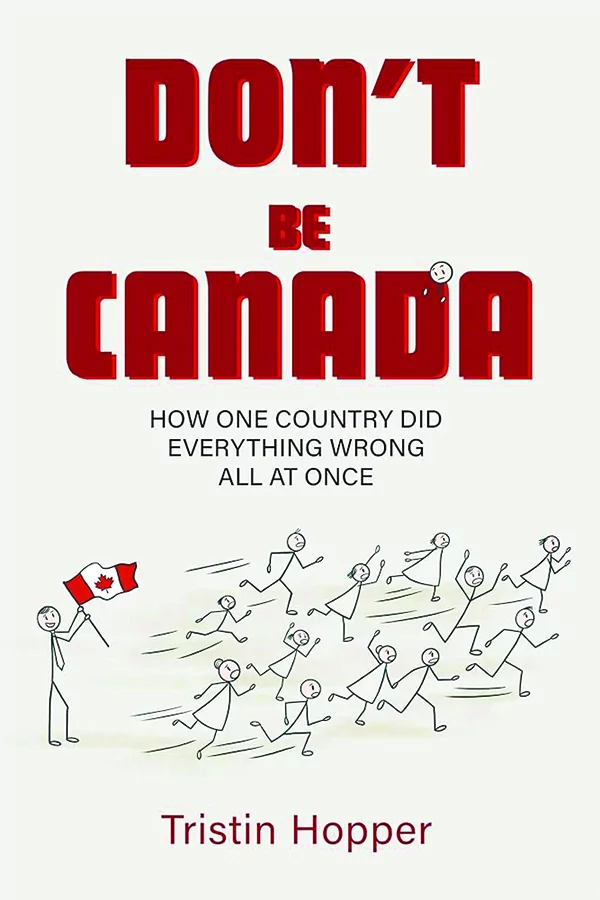At a time when the president of the United States tells everyone within earshot that he wants Canada to become America’s “cherished 51st state,” it feels mildly unpatriotic as a Canadian to review a book titled Don’t Be Canada, even more so for an American publication. Yet there is no escaping the fact that something has gone very, very wrong in the dominion of the north.
Once widely viewed as a boring but worthy place, everything seems to have fallen apart in Canada over the past decade or so. Foreign correspondents used to find it hard to make a living reporting on Canadian news. Now, not a month passes without some fresh horror, be it euthanasia for wheelchair users or life imprisonment for speech crimes, making international headlines. That is before mentioning the economy, the performance of which is so bad that Canada might drop out of the First World entirely, becoming Argentina without the sun. What happened?
This is the question that Tristin Hopper has set out to answer. A journalist for the center-right National Post, Hopper was once best known as the maker of the largest Rice Krispie square in Canada (unverified). But since then, it has become increasingly harder to find a place for humor in Canadian life, and Hopper, like many other Canadians, has been radicalized by the experience of seeing his country falling apart.

The result of his expression of barely suppressed rage is a short book, fewer than 100 pages in the main text, but not a slight one. In eight snappy chapters covering everything from crime to euthanasia — MAiD, or medical assistance in dying, in the detestable Canadian public sector lingo — to wokeness, he scrupulously describes how Canada’s governing classes have managed to screw up everything that was humanly possible to screw up, with devastating results for Canadians.
For such a slim book, Don’t Be Canada comes with relatively lavish endnotes. A good thing, too, because so many of its stories are so fantastical that many readers may simply dismiss them as fake news. When I first started to write about the horrors of Canada’s euthanasia regime, for example, I was accused of lying in a leading British newspaper. The journalist simply refused to believe that people were being coerced into state-funded suicide because of poverty in a first-world country. But Hopper brings receipts on this and other topics.
For instance, how many non-Canadian readers would believe that the Canadian government is committing genocide against Aboriginal women? Yet, as Hopper explains, since then-prime minister Justin Trudeau accepted the evidence-free findings of an activist-run inquiry in 2019, this has been the government’s official position, though no one seems to be particularly interested in asking why Trudeau is not standing trial at The Hague. Meanwhile, many of the criminals who murder Aboriginal women get laughably short sentences, thanks to a justice system that has entrenched two-tier, race-based sentencing as a fundamental principle.
Or take drug policy. In British Columbia, Hopper’s home province, the government has enacted “harm reduction” and “safer supply” policies, under which it provides free needles, crack pipes, which can be obtained from vending machines in hospitals, and drugs to addicts, many of whom “divert” their government-issued opioids to drug dealers in exchange for more potent stuff. Not unrelatedly, Britain’s Daily Telegraph declared Vancouver the “fentanyl capital of the world.”
These policies have led to an explosion in the number of drug overdose deaths, from 293 in 2011 to 2,511 in 2023, an enormous figure in a province with a population the size of Minnesota. Yet B.C.’s chief coroner’s response was to call a press conference at which she announced that to criticize safer supply was “divisive,” “harmful,” and put lives at risk. A few months later, B.C.’s Supreme Court declared that to prohibit the use of illegal drugs within 15 meters of a playground violated the Canadian constitution’s protection for “life, liberty and security of the person.”
Economist Milton Friedman once joked that if government administrators came to a desert, there would soon be a sand shortage. Canada is one of the world’s most sparsely populated countries, yet it somehow has managed the almost impossible feat of producing a housing shortage that is every bit as impressive as emptying the Sahara Desert of sand. Thanks to systematic municipal NIMBYism and unchecked mass immigration, Canada’s housing market is one of the worst in the world.
The situation is so dire that a secret government report warned of possible social unrest as a result, while fertility rates have crashed through the floor. In a recent survey, more than 70% of non-homeowning respondents said they had given up on ever owning a home. To this, successive governments have offered nothing but demand-side policies that have inflamed the never-popping housing bubble. In a country where so much of the boomers’ wealth is locked in inflated house prices — the total value of Canada’s residential real estate is now three times its annual GDP — to do anything else would be politically dangerous.
What has made Canada, which in the not-too-distant past was still one of the world’s best countries to live in, into such a basket case? Here, after chronicling Canada’s woes in remorseless sentences, Hopper hesitates to prosecute his case with his customary vigor. Perhaps the question is so enormous that it has no good answer. After all, many of the pathologies Canada is suffering from exist in other English-speaking Western democracies, even though Canada is unique in having combined them into such a toxic admixture.
His explanation is that Canada has “decided to run absolutely everything on the honour system and didn’t have the imagination to consider why this would be a bad idea.” Canadians have been so used to being governed by people who knew what they were doing that we have not mentally adjusted to the fact that our current rulers do not, in fact, know what they are doing. And when faced with the latest product of their misrule, we keep saying “this can’t be happening in Canada,” as if this alone will make things all right again.
This is a plausible explanation, yet I wonder whether Hopper is confusing the symptom with the disease. After all, Canada’s “Laurentian elite,” a small, incestuous group of people who hold disproportionate influence over Canadian life, has not changed much since the days when the country did remarkably well, and for the most part, they still want Canada to do well, even as they inflict untold damage on the country.
CANADA’S PREELECTION QUESTION: WHO CAN STAND UP TO DONALD TRUMP?
But what has been striking about so many of the developments chronicled by Hopper, from extreme identity politics to revolving-door bail policies, is the fact that they have their intellectual origins in the mind of some inane American progressive luminary. Canada’s elites have always taken their cues from the hegemon of the day, as there is nothing a provincial elite hates more than to be out of sync with metropolitan fashion. In other words, Canada is what happens if you enlarge the worst progressive American ideas to a transcontinental scale.
Whatever the cause for Canada’s present predicament, Hopper has done Canadians and non-Canadians alike a great service by documenting some of the most absurd and painful moments in Canada’s long decline. As I write these words, Canadians may be on the verge of giving a fourth consecutive mandate to the Liberal Party of Canada, which has been responsible for so much of what Hopper has chronicled in Don’t Be Canada. If this happens, we cannot pretend that we do not deserve what is coming next.
Yuan Yi Zhu is a professor at Leiden University and a research associate at the University of British Columbia’s Centre for Constitutional Law and Legal Studies.















